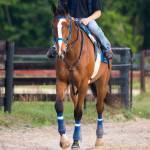Immunity: Training Creates Anti-Inflammatory State in Horses

As horses advance through a training regime, multiple body systems adapt to cope with the physical stressors of escalating work. While musculoskeletal and respiratory mechanisms undergo obvious alterations, other physiological networks, including the immune system, change more subtly.
Prolonged and exhaustive exercise, which may happen when overtraining occurs, results in decreased function of white blood cells, which can compromise their infection-fighting agenda. Although transient, this exercise-induced immunosuppression can result in increased upper respiratory tract infections. Seems straightforward enough, right? Research also shows that an immune function may improve with long-term physical activity, thus reducing the risk of inflammatory disorders and bacterial infections.
So, does exercise enhance or downgrade immunity?
To explore the topic, researchers collected blood samples from both trained and untrained horses immediately before and after racing exercise. Various parameters were measured, including the type of white blood cells in circulation, production of reactive oxygen species (free radicals), and the types of inflammatory mediators, such as interleukins and tumor necrosis factor-alpha, produced by white blood cells.*
“The researchers found that the immune system adapts in horses during conditioning,” said Rebecca Ham, a nutrition advisor for Kentucky Equine Research. Specifically, the immune cells in trained horses created an anti-inflammatory environment, whereas the immune cells in untrained horses produced a pro-inflammatory state.
“Recognizing that a pro-inflammatory state exists in horses in training has multiple implications. For example, supplementing these horses with antioxidants may help support their immune systems during adaptation and training,” Ham said. “Always choose a high-quality antioxidant supplement from a trusted source, such as Nano-E from Kentucky Equine Research. Antioxidants scavenge damaging free radicals and support a healthy immune system.”
*Witkowska-Piłaszewicz, O., R. Pingwara, and A. Winnicka. 2020. The effect of physical training on peripheral blood mononuclear cell ex vivo proliferation, differentiation, activity, and reactive oxygen species production in racehorses. Antioxidants (Basel) 9(11):1155.








